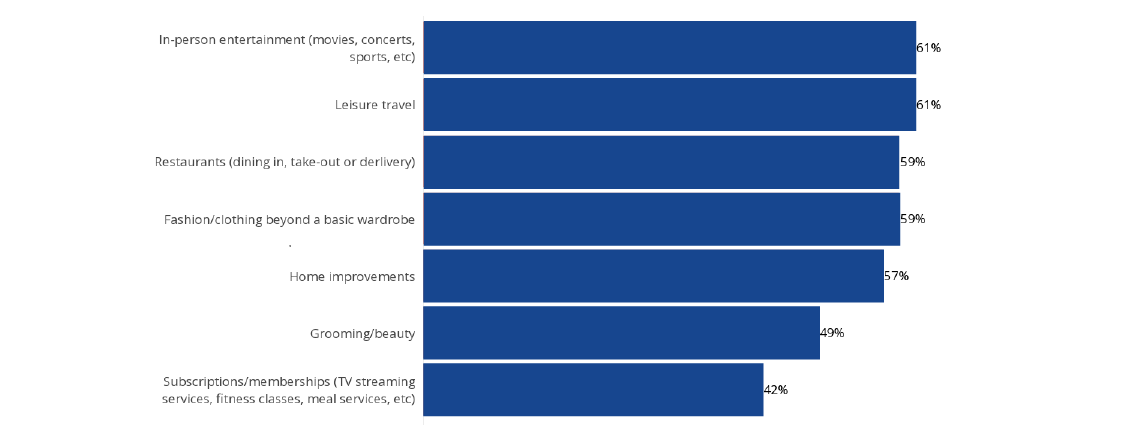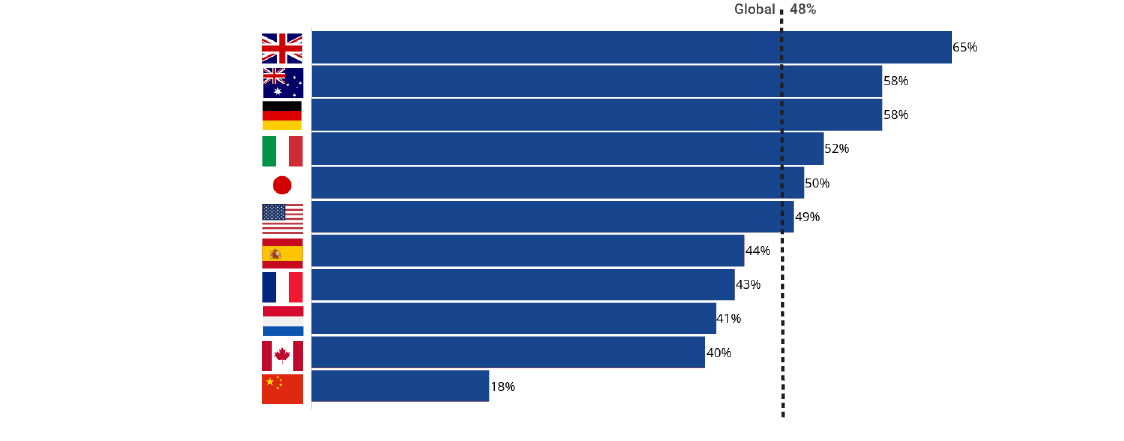Smart Homes for Thrifty Households
13 December 2022
Share with a Friend
All fields required where indicated (*)Faced with higher costs of living, households are employing smart home solutions to become more resilient and cut costs. As the gap between in-home and out-of-home experiences becomes easier to bridge, more saving opportunities emerge. For instance, with a home theater and a restaurant-quality homemade meal, we will likely become more selective about our out-of-home activities, saving them for valuable experiences we cannot do at home (yet).
People are struggling
Last October, big data firm IRI found that nearly three-quarters of European consumers are cutting back spending on everyday items.1 Almost two thirds have cut down on essentials (for example by missing meals or reducing heating), with a third using their personal savings or taking out loans to pay bills.
People are spending less on non-essentials
Compared with the beginning of 2022, % spending less on these "non-essentials"

Source: Dynata Global Consumer Trends, Q3 2022.
Similar findings come from Dynata, which found that about half (53%) of the people in 11 researched countries are (slightly) struggling to afford basic needs, while three quarters (73%) are (slightly) struggling to afford non-essential expenses. As the graph below shows, people are spending less on entertainment, leisure travel, clothes, beauty services and home improvements.2
Doing more at home can provide significant cost savings for thrifty households. In our June blog, we described how households have been installing smart home solutions – such as solar panels, energy management systems and heat pumps – to lower their cost of living. While energy is one of the most significant areas for saving money (see graph), now people are also exploring other options.
People are struggling to pay their energy bills
% Struggling to afford energy/utilities now

Source: Dynabyte Global Consumer Trens, Q3 2022.
People are creating new moments in home
Moreover, these home-based behaviors are increasingly becoming a good alternative for the conventional way of doing things. IRI1 notes that people are creating new occasions and moments for familiar everyday products, such as packed lunches at work and specialty coffees or pre-mixed drinks at home.
Instead of eating out or ordering in, people preparing more meals at home to save money. Smart home solutions, such as meal kit delivery services, recipe apps, or streamed cooking content (e.g. Cheflix) can make it easier to create restaurant-style meals at home. In addition, more can be saved by reducing food waste, an area that several smart fridges are already helping with by checking expiry dates.
Our homes offer a valuable alternative
Normally during recessions, people do not stop doing things altogether; instead they look for cheaper alternatives or go out less often. In the past, they would go to the movies instead of a concert. Today, they might prefer to play the newest games or watch popular films on the home entertainment system. With an implied cost per hour of $0.49, video games or streaming are less expensive than movie theaters ($5), theme parks ($12.50), sports events ($16.67), or concerts ($33.33).3
Some experiences, however, are still best experienced in real life. For instance, the experience gap between a real concert and a virtual one is still significant. The question is, though, will that remain the case? While the global live-music industry has seen a 5% compound annual growth rate in 2022 – on par with the growth between 2007 and 20194 and despite several high-profile cancellations – not everybody will be able to pay out an average $108 per ticket5.
This makes a reasonable case for virtual concerts, and several artists (including Ariana Grande, Justin Bieber, and Marshmello) are already experimenting with it.6
The examples from food, drink and entertainment show that our homes can offer a valuable alternative in the relative choices we have to make when deciding where to spend our money. This does not mean we will no longer go out, but by doing more in the home, and making full use of the technology inside it, we can become more resilient to deal with the tough times ahead.
1 https://www.iriworldwide.com/nl-nl/insights/news/demand-signals-2
2 Dynata Global Consumer Trends – Staying ahead of the downturn Q3 2022
3 Bernstein, US Media Roadshow, May 2018
4 https://www.billboard.com/pro/touring-recession-music-fans-buy-concert-tickets/
5 https://news.pollstar.com/2022/06/24/concert-industry-roars-back-pollstar-2022-mid-year-report/
6 https://www.hypebot.com/hypebot/2022/11/10-superstars-that-have-performed-in-the-metaverse.html
Istotne oświadczenia
Wyłącznie do celów informacyjnych i reklamowych.
Niniejsze informacje zostały opracowane przez VanEck (Europe) GmbH, który został wyznaczony na dystrybutora produktów VanEck w Europie przez podmiot zarządzający VanEck Asset Management B.V., założony zgodnie z prawem holenderskim i zarejestrowany w Holenderskim Urzędzie ds. Rynków Finansowych (AFM). VanEck (Europe) GmbH z siedzibą przy Kreuznacher Str. 30, 60486 Frankfurt, Niemcy, jest dostawcą usług finansowych podlegającym regulacji Federalnego Urzędu Nadzoru Finansowego w Niemczech (BaFin). Informacje te mają na celu jedynie dostarczenie inwestorom ogólnych i wstępnych danych i nie mogą być interpretowane jako porady o charakterze inwestycyjnym, prawnym czy podatkowym. Inwestorzy powinni skorzystać z profesjonalnego doradztwa w odniesieniu do ich konkretnych okoliczności i obszaru działania. VanEck (Europe) GmbH oraz jego podmioty stowarzyszone i powiązane (razem „VanEck”) nie ponoszą żadnej odpowiedzialności za jakiekolwiek decyzje inwestycyjne, dezinwestycyjne lub dotyczące wstrzymania inwestycji podjęte przez inwestora na podstawie tych informacji. Wyrażone poglądy i opinie są poglądami autora (autorów) i VanEck niekoniecznie musi je podzielać. Opinie są aktualne na dzień publikacji i mogą ulec zmianie w zależności od warunków rynkowych. Niektóre zawarte tu opinie mogą stanowić jedynie projekcje, prognozy i inne stwierdzenia dotyczące przyszłości, które nie odzwierciedlają rzeczywistych wyników. Informacje pochodzące ze źródeł trzecich uważa się za wiarygodne, ale nie zostały one poddane niezależnej weryfikacji, a więc nie można zagwarantować ich dokładności ani kompletności. Wszystkie wymienione wskaźniki odnoszą się do sektorów wspólnego rynku i ich wyników. Nie jest możliwe inwestowanie bezpośrednio w indeks.
Podane wyniki bazują na danych historycznych i nie gwarantują osiągnięcia identycznych wartości w przyszłości. Inwestowanie jest obarczone ryzykiem, w tym możliwą utratą kapitału. Przed dokonaniem inwestycji w fundusz należy zapoznać się z Prospektem oraz Kluczowymi informacjami dla inwestorów.
Żadna część tego materiału nie może być powielana w jakiejkolwiek formie ani przywoływana w innych publikacjach bez pisemnej zgody VanEck.
© VanEck (Europe) GmbH
Zapisz się, aby otrzymywać nasz biuletyn ETF